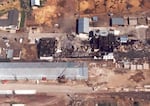An environmental and animal rights activist pleaded guilty Thursday to decades-old federal arson charges, including involvement in a 1997 central Oregon fire that destroyed a slaughterhouse.
Prosecutors say Joseph Mahmoud Dibee, 54, was a member of the Earth Liberation Front and Animal Liberation Front, which the U.S. Department of Justice has held responsible for acts of domestic terrorism.
Dibee pleaded guilty to arson and conspiracy to commit arson for his role in the fire that destroyed Cavel West, a slaughterhouse that processed and sold horse meat in Europe.

The federal government claims Joseph Dibee and a group of other environmental activists caused significant damage to the Cavel West horse slaughter facility in Madras, Oregon, in 1997.
via Federal Bureau of Investigations
In court documents, federal prosecutors say Dibee drilled a hole in the concrete wall of the slaughterhouse. He then poured fuel into the wall and stuffed it with rags. The plan went off course when one of Dibee’s homemade incendiary devices caught fire prematurely.
During Thursday’s hearing, U.S. District Court Judge Ann Aiken asked Dibee if it was true he poured gasoline into the building and ignited the fuel to start a fire.
“You acted with the intent to destroy the facility and you knew it was involved in interstate commerce,” Aiken said. “Are those facts true?”
“Yes your honor,” Dibee replied.
Dibee also pleaded guilty to a single charge of conspiracy to commit arson in California for his role in a 2001 fire that burned hay and a pole barn at a Bureau of Land Management wild horse facility near Litchfield.
“You participated in surveillance of the BLM Litchfield horse facility, knowing that the others intended to burn a structure,” Aiken said. “After the arson and the destruction of the government property, you traveled back to Oregon with the co-conspirators knowing they had burned the BLM haybarn. You knew that the buildings involved were government buildings.”
“Yes your honor,” Dibee said.
Between 1995 and 2001, a group of Earth Liberation Front and Animal Liberation Front supporters known as “The Family” caused more than $45 million in damages in a series of arsons. One of their highest-profile fires was in 1997 when they destroyed the Two Elk ski lodge in Vail, Colorado. Dibee is not connected to that incident.
In 2006, a grand jury in Oregon indicted Dibee and several others in connection with the Cavel West arson. Dibee fled the country, first to Syria and later to Russia. While an international fugitive, he says he worked on large-scale environmental projects like a biofuels facility and a desalination plant.
He was arrested by Cuban authorities in August 2018 while traveling from South America back to Russia. The FBI flew Dibee from Havana to Portland where he was arraigned and held in custody for more than two years.
“No matter the agenda, using violence to advance a social or political cause is a serious crime,” Oregon’s U.S. Attorney Scott Asphaug said in a recorded statement Thursday. “After many years on the run, Mr. Dibee admitted to his role in these schemes and will finally face justice.”
After his arrest, the Justice Department called Dibee a “domestic terrorism suspect.” That description wasn’t used during Thursday’s hearing when Dibee entered his guilty plea. A news release after the hearing referred to Dibee as an “environmental extremist, arsonist, and former fugitive.”
Matt Schindler, Dibee’s defense attorney, believes calling Dibee a domestic terrorist goes too far and said it is important to note the governments change in rhetoric.
“Mr. Dibee was involved with the arson at Cavel West, and so it was important that he take responsibility for that,” Schindler said Thursday after court.
He said Dibee’s case is a reminder that the labels the Justice Department assigns to people should be viewed with caution.
“They know the power of the language that they use. It is intentional,” Schindler added. “You cannot talk about this case without talking about terrorism and that’s the narrative the government wants.”

Joe Dibee sits on steps leading to his family's home on Wednesday, February 17, 2021, in Seattle.
Megan Farmer / KUOW
In January 2021, Dibee was released from custody. Since then, he’s been in home confinement in Seattle, where he cared for his elderly father.
Dibee has long contested the government’s characterization of his actions as domestic terrorism.
“In most cases where the government charges terrorism, it’s actually not,” Dibee told OPB last year. “The thing is for me, being an Arab man in the United States, I’m more susceptible, more vulnerable to that accusation. And I recognize that.”
In that interview, Dibee said he was not involved in any organized environmental groups, but acknowledged he had a “confrontational” approach to his beliefs in the ‘90s. He said his approach to environmental causes has changed since then, and he is focused on using technology to help people adapt to the effects of climate change.
Aiken will sentence Dibee on July 27. As part of the plea agreement, the Justice Department dropped arson charges against Dibee in Washington state. He’s also agreed to pay restitution, though the dollar amount will be determined at sentencing.
The U.S. Justice Department is recommending Dibee serve a little over seven years in prison. He’s expected to ask for a lighter sentence.
